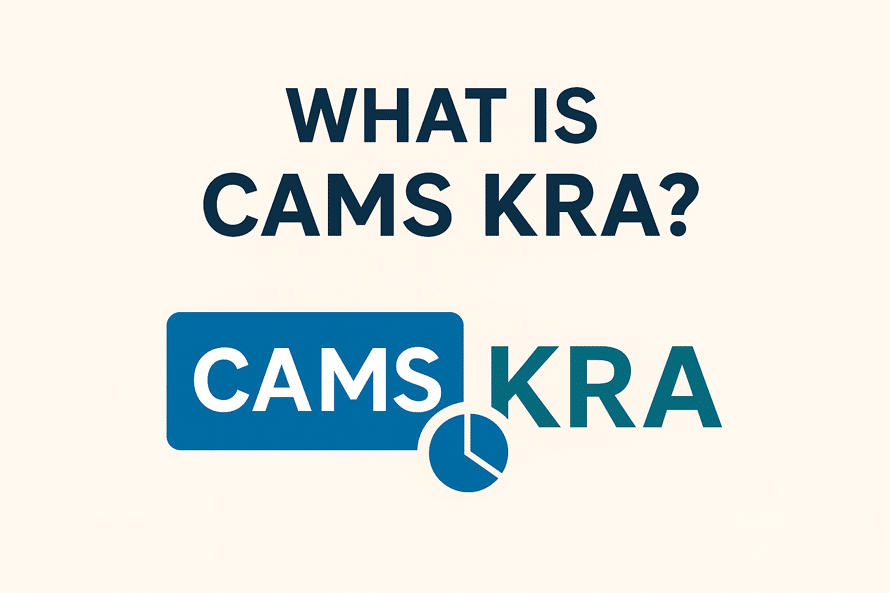What is CAMS KRA? How to Check KYC Status?

As technology has evolved rapidly over the past few years, investing in mutual funds has become increasingly common. Investing has become easier, and the processes that accompany it have also been streamlined. A KRA is an agency that administers Know Your Customer (KYC) registrations. For KYC data, KRA serves as a central repository. Let’s learn what CAMS KRA is in detail and how you can check your KYC status.
What is CAMS KRA?
Computer Age Management Services (CAMS) is India’s leading mutual fund transfer agency. They offer a wide range of services to mutual fund clients, such as Know Your Customer (KYC) registration. Additionally, they simplify the process, making it easier for transactions to proceed smoothly between different fund houses.
Full Form and Meaning of CAMS KRA
The Computer Age Management Services Know Your Customer Agency (CAMS KRA) is an agency that handles KYC registration. The main job of CAMS KRA is to keep accurate records of the KYC of people who invest in mutual funds. CAMS KRA is a valuable online service that enables fund houses to access Know Your Customer (KYC) data easily.
The Role of CAMS KRA in KYC Process
CAMS KRA processes, stores, and retrieves the KYC-related documents using state-of-the-art technology. As a reliable KRA, they ensure that regulations are consistently followed and updated. It is possible to complete the CAMS KYC process online on their website, or you can also do it offline.
How CAMS KRA Works with SEBI Regulations
SEBI has made it clear what KYC Registration Agencies (KRAs) need to do to ensure the KYC process is safe, standardized, and efficient. To ensure they are following the rules and to make things more straightforward between financial institutions, KRAs must maintain a central KYC repository, apply strict data protection measures, and undergo regular checks.
Importance of KYC in Mutual Funds and Investments
Know Your Customer (KYC) is crucial for mutual funds and investments, as it enables the linking of investors’ names to prevent scams and ensure compliance with SEBI and AML regulations. Additionally, it facilitates easier deals, keeps records in one place, and enhances due diligence, ultimately making the banking system safer and more trustworthy.
Why KYC is Mandatory for Investors
The SEBI requires that investors prove who they are and where they live through a process called Know Your Customer, or KYC. It protects investors and prevents money laundering by verifying the identity of individuals before they can access banking services.
How CAMS KRA Simplifies KYC Verification
CAMS KRA streamlines the KYC process for individuals by efficiently verifying all the information they submit. Investors can begin investing in mutual funds once the KYC is accepted. They can invest all at once or use Systematic Investment Plans (SIPs). Besides, they won’t have to resend their KYC information for each transaction.
How to Check KYC Status via CAMS KRA
It’s essential to keep track of your KYC status so that deals in mutual funds and other financial services go smoothly. You can check your KYC status with CAMS KRA both online and offline. This makes the process easy and available to all clients.
Step-by-Step Guide to Check KYC Status Online
It’s essential to be aware of CAMS KRA and how to verify your KYC status. Here’s how to check the status online:
- Visit the CAMS KRA website and locate the section titled ‘KYC Status’.
- To log in securely, please enter your PAN, Aadhaar, and any other required information.
- As soon as you log in, your current KYC state will show up on the screen.
Required Documents for Checking KYC Status
In addition to their Know Your Client registration form and a passport-sized photo, investors need to submit the following documents:
- ID Proof: Your PAN card, driver’s license, a copy of your passport, your Aadhaar card, or a bank passbook.
- Proof of Where You Live: A copy of your passport, a recent landline or mobile bill, a power bill, a recent bank passbook, a voter ID, a rental agreement, a driver’s license, or an Aadhaar card.
Interpreting KYC Status: Verified, On Hold, Rejected
You can start buying mutual funds right away if your KYC has been verified. Additionally, you may need to resubmit the papers or provide more information if it is put on hold or rejected.
Common Issues in KYC Process and How to Resolve Them
KYC processes have problems. Data often doesn’t match. There are issues linking PAN and Aadhaar. Verifying an email or phone number can be difficult. Some statuses remain On Hold. Resubmit the KYC in accordance with SEBI guidelines after updating the legal papers and verifying the contact information to resolve these concerns.
What to Do if KYC is Rejected or On Hold
If your KYC is rejected or put on hold, visit the mutual fund or KRA website first to understand the reason. The reason is usually an incorrect phone number or email address, or a difference between your name as mentioned in PAN and Aadhaar. Correct the specific issue and resubmit or update your paper online. After fixing the problem, your status will be updated to ‘Validated’ or ‘Registered’. This change will allow you to trade mutual funds freely.
Updating KYC Information via CAMS KRA
Making changes to your KYC through CAMS KRA is straightforward. Go to the CAMS KRA site and select KRA KYC change. After that, provide any updated paperwork along with your PAN and Aadhaar number in the online form. In a few days, changes may be made to details like your phone number, email address, or address.
CAMS KRA vs Other KRAs: A Quick Comparison
CAMS KRA has several physical service centers, robust security measures, and an intuitive system that seamlessly integrates online and offline activities. Additionally, all KRAs work together; however, CAMS provides a central location for Know Your Customer (KYC) services, robust scam checks, and expedited updates among all parties.
Conclusion
CAMS KRA has simplified the KYC process, making it faster, more efficient, and more effective. Additionally, updates to KYC records are made daily and stored in a central system. This standardized method is suitable for investors and enables mutual fund houses to view and verify investment records easily.
FAQs
Q. What is the full form of CAMS KRA?
It stands for Computer Age Management Services KYC Registration Agency. The KYC Information Centre, CAMS KRA, was established to simplify the KYC process for Indian investors, particularly those looking to invest in mutual funds.
Q. Is KYC mandatory for investing in mutual funds?
Yes, you have to go through KYC to invest in mutual funds. The law requires checking users’ names and addresses before they can enroll in mutual fund plans.
Q. Can I check KYC status on the CAMS website?
For online KYC checks, you’ll need to go to the website of a KYC Registration Agency (KRA) or the site where you started the KYC process, like a bank. You’ll usually need your PAN (Permanent Account Number) to check your status online.
Q. How long does it take to verify KYC via CAMS KRA?
Your KYC verification usually takes just a few minutes. In some cases, however, the process can take up to 24 hours because specific papers or details require manual review. Besides, most of the time, KRA takes 3–5 days. Please note that KRA will send investors an SMS and an email to verify that their contact information is accurate.
Q. What documents are required for KYC verification?
For KYC identification, people must show proof of their name and home address. Passport, Voter ID, Driving License, Aadhaar Card, and a letter from the National Population Register with your name and address on it are all acceptable forms of identification. These make sure that all financial institutions can identify investors correctly and legally.
Q. How to update my KYC details in CAMS KRA?
It’s easy and quick to change your KYC information through a KYC Registration Agency (KRA). Visit the website first. Besides, to find your CAMS KRA, enter your PAN. Then, use the OTP to confirm your information. Finally, follow the on-screen instructions to finish the update process easily.
Q. Is KYC verification a one-time process?
KYC is not a one-time process. When you first open an account or deal with a financial institution, the original proof is a one-time process. However, KYC also includes ongoing tracking and regular updates. This means that banks and fund houses regularly verify and update customer information to ensure it is accurate and compliant with relevant regulations.
Q. Can I have multiple KYC records across different KRAs?
You can’t have more than one KYC record for different KRAs. KYC Registration Agencies (KRAs) are designed to unify and simplify the KYC verification process. This means that once you’ve finished the KYC process with one KRA, all other KRAs and intermediaries can view your details.
Disclaimer
The stocks mentioned in this article are not recommendations. Please conduct your own research and due diligence before investing. Investment in securities market are subject to market risks, read all the related documents carefully before investing. Please read the Risk Disclosure documents carefully before investing in Equity Shares, Derivatives, Mutual fund, and/or other instruments traded on the Stock Exchanges. As investments are subject to market risks and price fluctuation risk, there is no assurance or guarantee that the investment objectives shall be achieved. Lemonn (Formerly known as NU Investors Technologies Pvt. Ltd) do not guarantee any assured returns on any investments. Past performance of securities/instruments is not indicative of their future performance.







